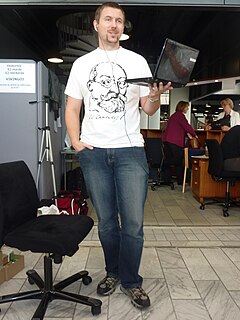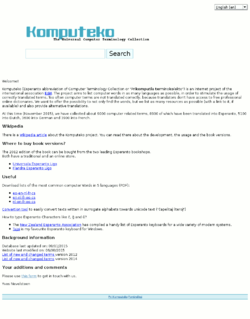
Esperanto is the world's most widely spoken constructed international auxiliary language. It is the only such language with a population of native speakers, of which there are perhaps several thousand. Usage estimates are difficult, but two recent estimates put the number of active speakers at around 100,000. Concentration of speakers is highest in Europe, East Asia and South America. The Universal Esperanto Association has more than 5,500 members in 120 countries. The language has also gained a noticeable presence on the internet in recent years, as it became increasingly accessible on platforms such as Duolingo.

Esperantujo or Esperantio[esperanˈtio] is the Esperanto community: the community of speakers of the Esperanto language and their culture, as well as the places and institutions where the language is used. The term is used "as if it were a country."

L. L. Zamenhof developed Esperanto in the 1870s and '80s. Unua Libro, the first print discussion of the language, appeared in 1887. The number of Esperanto speakers have increased gradually since then, without much support from governments and international organizations. Its use has, in some instances, been outlawed or otherwise suppressed.
The World Esperanto Youth Organization is an organization dedicated to supporting young Esperanto speakers around the world and promote the use of Esperanto. TEJO was founded in 1938 as the Tutmonda Junular-Organizo and took its current name in 1952. In 1956, TEJO became the youth section of the Universal Esperanto Association (UEA). In 1971, the finances and administration of TEJO were fully integrated into those of UEA.

The Universal Esperanto Association, also known as the World Esperanto Association, is the largest international organization of Esperanto speakers, with 5501 individual members in 121 countries and 9215 through national associations and in official relations with the United Nations. In addition to individual members, 70 national Esperanto organizations are affiliated with UEA. Its current president is the professor Duncan Charters. The magazine Esperanto is the main organ used by UEA to inform its members about everything happening in the Esperanto community.
The Esperantic Studies Foundation, abbreviatedESF is a non-profit organisation initiated in 1968 by Jonathan Pool, E. James Lieberman and Humphrey Tonkin, with the aim to further the understanding and practice of linguistic justice in a multicultural world, with a special focus on the study of interlinguistics and the role of Esperanto.
The languages of the European Union are languages used by people within the member states of the European Union (EU).

lernu! is a multilingual, web-based free project for promoting and teaching Esperanto. The name Lernu comes from the imperative form of the Esperanto verb lerni, meaning "to learn". The site is run by E@I, an international youth organization, which started as a working group of the World Esperanto Youth Organisation.
The Delegation for the Adoption of an International Auxiliary Language was a body of academics convened in the early part of the 1900s (decade) to decide on the issue of which international auxiliary language should be chosen for international use. The ultimate decision of the committee charged by the Delegation was to adopt the Esperanto language, but with certain reforms. The result became a distinct language known as Ido.
The European Day of Languages is observed 26 September, as proclaimed by the Council of Europe on 6 December 2001, at the end of the European Year of Languages (2001), which had been jointly organised by the Council of Europe and the European Union. Its aim is to encourage language learning across Europe.

The Esperantist of the Year is an honorary designation bestowed each year by the editors of the Esperanto-language monthly La Ondo de Esperanto. The award recipient is selected by an international jury led by Halina Gorecka, the Russian publisher of the magazine.

The Conference on the Application of Esperanto in Science and Technology is a biennial conference on the application of the constructed international auxiliary language Esperanto in the science and technology community.

The World Esperantist Vegetarian Association is a voluntary association of Esperanto-speaking vegetarians. Founded in 1908, the group's working language is Esperanto, and it is the oldest international organization of vegetarians that is currently active. TEVA published a journal, Vegetarano ("Vegetarian") from 1914 to 1932, revived in 2009 as Esperantista Vegetarano, and has also operated a spirited Internet mailing list through Yahoo! Groups since 2005.

Peter Baláž, in Esperanto known as Petro, is an Esperantist, publisher and editor; he was selected as the 2012 Esperantist of the Year. Baláž lives in his hometown of Partizánske and speaks Slovak, Czech, German, Polish, Russian and English, as well as the international planned language Esperanto.

Komputeko is an online project of the non-profit youth organization E@I (“Education@Internet”) with the goal of bringing together parallel computer terminology from various dictionaries in order to facilitate access to and comparison between different translations and thus promote exact use of language and counteract the usage of linguistic borrowings from American English. Komputeko is short for the Esperanto noun phrase "Prikomputila terminokolekto", meaning "collection of computer terms". The dictionary is written in five languages, and there are plans to expand it into other languages. A preliminary version with a few other languages already exists.

Mark Fettes is an Esperantist and university professor of education, and former President of the World Esperanto Association, known by its Esperanto initials as UEA.

The following outline is provided as an overview of and topical guide to Esperanto:
The Esperanto League of Bosnia and Herzegovina is the national Esperanto association in Bosnia and Herzegovina, which represents Esperanto speakers, Esperanto societies, and friends. Since its establishment in 1910, it helps advancement of Esperanto language learning and usage in Bosnia and Herzegovina.












